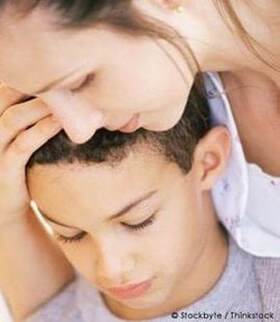
By: Dr. Becker
If your family includes a young child and a dog, cat or other companion animal with a relatively short lifespan, you could at some point be faced with helping your youngster cope with the death of a much-loved pet.
And you must do this during a time when you're dealing with your own grief.
The loss of a pet is often felt as deeply and painfully as the passing of a human family member or close friend.
And since for many children this will be their first experience with death, confusion, fear and even guilt can accompany feelings of grief and sadness. Some kids express anger toward friends who still have their pets. Other children worry their classmates and friends will make fun of them for feeling so sad at the loss of their pet.
Talk Together, Feel Together It's best not to make assumptions about what your child is or isn't feeling, does or doesn't understand, or his beliefs about what has happened to his pet. Kids get input from many sources beyond their parents.
If your family includes a young child and a dog, cat or other companion animal with a relatively short lifespan, you could at some point be faced with helping your youngster cope with the death of a much-loved pet.
And you must do this during a time when you're dealing with your own grief.
The loss of a pet is often felt as deeply and painfully as the passing of a human family member or close friend.
And since for many children this will be their first experience with death, confusion, fear and even guilt can accompany feelings of grief and sadness. Some kids express anger toward friends who still have their pets. Other children worry their classmates and friends will make fun of them for feeling so sad at the loss of their pet.
Talk Together, Feel Together It's best not to make assumptions about what your child is or isn't feeling, does or doesn't understand, or his beliefs about what has happened to his pet. Kids get input from many sources beyond their parents.
Depending on your child's age, he's picking up information from other children, from TV shows, the internet, books, magazines, movies, music, teachers and other adults. Often parents mistakenly believe their children form opinions and ideas identical to their own. But youngsters filter information in their own way and reach their own conclusions and beliefs about experiences and events.
Talk to your child about the death in an open, honest manner, and share your own feelings as a way of encouraging him to share his. Keep the lines of communication open and you'll likely discover either your youngster has a good understanding of what has happened, or he's harboring some misconceptions you can clear up for him.
According to grief experts, one of the most important things you can do when your family loses a beloved pet is to avoid telling your child how she should feel.
Children should not be criticized for crying or told to be 'strong.'
Talk to your child about the death in an open, honest manner, and share your own feelings as a way of encouraging him to share his. Keep the lines of communication open and you'll likely discover either your youngster has a good understanding of what has happened, or he's harboring some misconceptions you can clear up for him.
According to grief experts, one of the most important things you can do when your family loses a beloved pet is to avoid telling your child how she should feel.
Children should not be criticized for crying or told to be 'strong.'
You can help your youngster grieve in a productive way by being open about your own sense of sadness and loss. Be honest about how you're feeling and don't try to hide your emotions.
Do take care not to frighten your child with an out-of-control expression of grief. Crying is fine. Wailing, screaming or other very dramatic displays of emotion are not appropriate in front of a child who views you as her safe harbor. Share in your child's sadness -- don't overwhelm it with your own. Be your youngster's protector, even during periods of intense sorrow.
When you model a healthy way of dealing with grief, it helps your child realize others experience pain and sadness just as she does, her feelings are normal and acceptable, and she isn't alone during this difficult time.
Grief is a process, not an event. It takes time to work through the process. The good news is the vast majority of kids will adjust in a normal, healthy way to the loss of a pet if the parents' approach is gentle, simple and honest.
Do take care not to frighten your child with an out-of-control expression of grief. Crying is fine. Wailing, screaming or other very dramatic displays of emotion are not appropriate in front of a child who views you as her safe harbor. Share in your child's sadness -- don't overwhelm it with your own. Be your youngster's protector, even during periods of intense sorrow.
When you model a healthy way of dealing with grief, it helps your child realize others experience pain and sadness just as she does, her feelings are normal and acceptable, and she isn't alone during this difficult time.
Grief is a process, not an event. It takes time to work through the process. The good news is the vast majority of kids will adjust in a normal, healthy way to the loss of a pet if the parents' approach is gentle, simple and honest.
|
Age Appropriate Discussions of Death If your child is still a toddler of two or three, he's unlikely to understand death. Kids in this age group should be told their pet has died and will not return, but that they are in no way the cause of it.
Resist the urge to sugarcoat the facts with phrases like 'put to sleep' or 'God has taken.' Children can misunderstand these phrases, and you don't want to inadvertently create a fear of bedtime or of a God who reaches down and snatches away beloved pets. When you talk to a two or three year-old, there's no need to add a lot of details. Keep the information simple. Children often ask the same questions over and over again. This is completely normal. Keep answering the questions in simple terms, without feeling a need to elaborate. |
Four to six year-olds tend to view death as more of a change in the pet's existence than the end of life. They may imagine their pet is living in the sky or below the house, for example.
Kids in this age bracket can be especially prone to feeling responsible for their pet's death, and need repeated reassurance they are not to blame. They can also begin to fear their own death. Again, gentle reassurance is needed.
Keep discussions short with your pre-schooler. Allow him to freely express his feelings and encourage questions, which can give you an opportunity to extinguish any sense of guilt or fear he may be experiencing.
Children in the seven to nine year-old range can grasp the concept that death is permanent. They tend to be less afraid of their own death, but fear the death of their parents. Again, the best approach is to encourage communication and offer brief, straightforward answers to you child's questions.
Adolescents and teens tend to deal with the death of a pet much like adults do. However, most adults have more experience with death and the feelings that accompany loss, as well as the knowledge that things do get better with time.
Kids in this age bracket can be especially prone to feeling responsible for their pet's death, and need repeated reassurance they are not to blame. They can also begin to fear their own death. Again, gentle reassurance is needed.
Keep discussions short with your pre-schooler. Allow him to freely express his feelings and encourage questions, which can give you an opportunity to extinguish any sense of guilt or fear he may be experiencing.
Children in the seven to nine year-old range can grasp the concept that death is permanent. They tend to be less afraid of their own death, but fear the death of their parents. Again, the best approach is to encourage communication and offer brief, straightforward answers to you child's questions.
Adolescents and teens tend to deal with the death of a pet much like adults do. However, most adults have more experience with death and the feelings that accompany loss, as well as the knowledge that things do get better with time.
Often it's helpful to reassure an adolescent or teenager that as painful as her feelings are at this moment, they will subside and she'll begin to feel better.
Memorializing Your Child's Pet Offering your child choices of how to memorialize and say goodbye to a cherished pet can help him through the grief process.
You might offer him the choice of whether to bury or cremate, and whether to have a burial service. You can also give him the option to bury his pet with a favorite toy or bedding. You can also offer your youngster the opportunity to keep something that belonged to his pet, like a collar. Some children choose to draw a picture of their pet or write a letter to him. You can also have your child join you in gathering photos of your pet to put in a special album.
It's often helpful if family members gather to share memories of their pet. This activity usually produces both laughter and tears, but it can be very helpful for your child to see that everyone in the family is missing the pet and feeling the loss in their own way.
There are also a number of excellent children's books on pet loss that you can read with your youngster. Most are written especially for kids and address many of the feelings, concerns and fears youngsters have when a beloved pet dies.
Memorializing Your Child's Pet Offering your child choices of how to memorialize and say goodbye to a cherished pet can help him through the grief process.
You might offer him the choice of whether to bury or cremate, and whether to have a burial service. You can also give him the option to bury his pet with a favorite toy or bedding. You can also offer your youngster the opportunity to keep something that belonged to his pet, like a collar. Some children choose to draw a picture of their pet or write a letter to him. You can also have your child join you in gathering photos of your pet to put in a special album.
It's often helpful if family members gather to share memories of their pet. This activity usually produces both laughter and tears, but it can be very helpful for your child to see that everyone in the family is missing the pet and feeling the loss in their own way.
There are also a number of excellent children's books on pet loss that you can read with your youngster. Most are written especially for kids and address many of the feelings, concerns and fears youngsters have when a beloved pet dies.

















